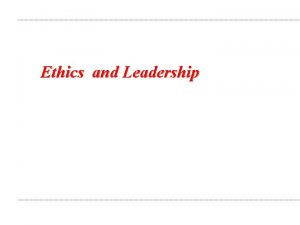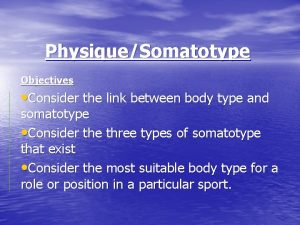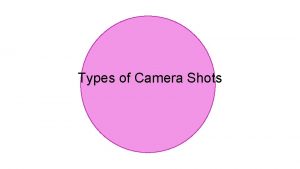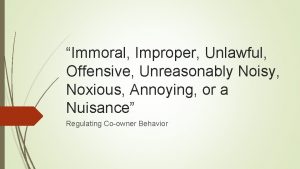AUTONOMISM EXTREME AUTONOMISM PRIME IMMORAL EXTREME AUTONOMISM DYNAMIC

















![MODERATE IMMORALISM • “[T]he ethical flaws of works are sometimes aesthetic merits in them. MODERATE IMMORALISM • “[T]he ethical flaws of works are sometimes aesthetic merits in them.](https://slidetodoc.com/presentation_image_h/2bb10cf8f78e7d89d250e6b7e989a324/image-18.jpg)







![ARGUMENT FROM THE ROUGH HERO • “[A]t the film’s Hollywood premier, at the point ARGUMENT FROM THE ROUGH HERO • “[A]t the film’s Hollywood premier, at the point](https://slidetodoc.com/presentation_image_h/2bb10cf8f78e7d89d250e6b7e989a324/image-26.jpg)





![THE MERITED RESPONSE ARGUMENT • “[W]here vicious manners are described, without being marked with THE MERITED RESPONSE ARGUMENT • “[W]here vicious manners are described, without being marked with](https://slidetodoc.com/presentation_image_h/2bb10cf8f78e7d89d250e6b7e989a324/image-32.jpg)



- Slides: 35

AUTONOMISM

EXTREME AUTONOMISM PRIME IMMORAL

EXTREME AUTONOMISM DYNAMIC MORAL

POLL 1. What do you think of extreme autonomism (the view that it doesn’t make sense to morally evaluate works of art)? I am inclined to agree with extreme autonomism. B. I am inclined to disagree with extreme autonomism. A.

MODERATE AUTONOMISM • While it makes sense to morally evaluate artworks, the moral flaws (or successes) of artworks are never aesthetic flaws (or successes) in them. • “When it seems that ethical flaws in works are aesthetically relevant, it is in fact not their ethical badness, but some other features of the expression of these flaws that is relevant” (Gaut 2011, 433).

ARGUMENT FROM CASES 1) Some works of art are both extremely immoral and aesthetic masterpieces. 2) If some works of art are both extremely immoral and aesthetic masterpieces, then the immorality of an artwork is irrelevant to its aesthetic value. 3) So: the immorality of an artwork is irrelevant to its aesthetic value.

POLL 1. Which premises do you reject (if any)? A. (1) Some works of art are both extremely immoral and aesthetic masterpieces. B. (2) If some works of art are both extremely immoral and aesthetic masterpieces, then the immorality of an artwork is irrelevant to its aesthetic value. C. Both premises (1) and (2). D. I accept both premises: autonomism is true!

ARGUMENT FROM CASES • Premise (2) might be true if the moralist held that moral merits are the only aesthetic merits that there are. • But we should be pluralists about aesthetic value. • Triumph of the Will is aesthetically flawed insofar as it is immoral. • Nonetheless, all things considered, it may still be an aesthetic masterpiece.

ARGUMENT FROM INSEPARABILITY 1) If moralism is true, then there is a moral flaw of a work that is also an aesthetic flaw of that work. 2) If so, then if that moral flaw were to be removed, the aesthetic value of the work would improve. 3) That’s implausible. 4) So: moralism is false.

ARGUMENT FROM INSEPARABILITY ALL THINGS CONSIDERED GOODMAKER BADMAKER kind deceptive ACTION F, G, …

ARGUMENT FROM INSEPARABILITY ALL THINGS CONSIDERED BAD GOODMAKER F, G, … BADMAKER ACTION

ARGUMENT FROM INSEPARABILITY ALL THINGS CONSIDERED AESTHETICALLY GOODMAKER BADMAKER racist formally beautiful, etc. F, G, …

ARGUMENT FROM INSEPARABILITY ALL-THINGS-CONSIDERED AESTHETICALLY BAD GOODMAKER BADMAKER F, G, …

ARGUMENT FROM FORMALISM • The aesthetic value of a work is wholly determined by the directly perceivable formal features of that work. • But if that is right, then moderate autonomism is true.

ARGUMENT FROM FORMALISM • If one only paid attention to the lines and colors of Picasso's Guernica, failing to see how Picasso uses those lines and colors to convey something about the horror of war, then one would be missing something about the aesthetic value of that piece.

POLL Moderate autonomism: the moral flaws of artworks are never aesthetic flaws in them. 1. What do you think of moderate autonomism? A. I lean toward accepting it B. I lean toward rejecting it

IMMORALISM
![MODERATE IMMORALISM The ethical flaws of works are sometimes aesthetic merits in them MODERATE IMMORALISM • “[T]he ethical flaws of works are sometimes aesthetic merits in them.](https://slidetodoc.com/presentation_image_h/2bb10cf8f78e7d89d250e6b7e989a324/image-18.jpg)
MODERATE IMMORALISM • “[T]he ethical flaws of works are sometimes aesthetic merits in them. . . depending on the artistic context in which they occur” (Gaut 2011, 435). • Moderate immoralists reject the “valence constraint. ”

ARGUMENT FROM CASES • Artworks are sometimes praised for their “transgressive” or “subversive” qualities. • That gives at least some evidence to think that those qualities are aesthetic successes in those works.

ARGUMENT FROM CASES • We must distinguish between the attitudes a work represents and the attitudes a work endorses. • There also more than one way for a work to be “transgressive”—inviting us to question our moral views by showing us morally bad ones versus prescribing morally bad views.

ARGUMENT FROM COGNITIVISM 1) If cognitivism is true, then cognitive merits are 2) 3) 4) 5) sometimes aesthetic merits. If cognitive merits are sometimes aesthetic merits, then if the immoral perspectives of certain artworks can communicate truths to us, then immoralism is true. Cognitivism is true. The immoral perspectives of certain artworks can communicate truths to us. So: immoralism is true.

ARGUMENT FROM COGNITIVISM • If some work communicates, e. g. , that bullying is morally good, then it communicates a falsehood—and that is not a cognitive merit. • But if the work communicates, e. g. , that we can be seduced into finding bullying attractive, then that may be true—but then the work appears to be criticizing immorality (not endorsing it)!

ARGUMENT FROM THE ROUGH HERO • Works that fall into the genre of the rough hero have immoral perspectives in that they prescribe positive attitudes toward morally abhorrent characters. • This is an both a moral failing and aesthetic achievement of these works. A. W. Eaton

ARGUMENT FROM THE ROUGH HERO Milton’s Satan

ARGUMENT FROM THE ROUGH HERO Judge Holden
![ARGUMENT FROM THE ROUGH HERO At the films Hollywood premier at the point ARGUMENT FROM THE ROUGH HERO • “[A]t the film’s Hollywood premier, at the point](https://slidetodoc.com/presentation_image_h/2bb10cf8f78e7d89d250e6b7e989a324/image-26.jpg)
ARGUMENT FROM THE ROUGH HERO • “[A]t the film’s Hollywood premier, at the point where Bonnie and Clyde are gunned down, one viewer reportedly stood up and loudly yelled, ‘Fucking cops!’” (285). Bonnie and Clyde (1967)

ARGUMENT FROM THE ROUGH HERO • A work in the rough hero genre invites our moral disapproval • • of a central character whose “flaws are. . . grievous: he is usually a sociopath, an outlaw, a murderer, a sex criminal, a sadist, or Satan incarnate” (Eaton 2012, 284). It also morally undermines itself by simultaneously prescribing positive (and immoral!) attitudes toward that character. This prompts an aesthetically valuable experience, one of ambivalence that makes the work compelling. This is an aesthetic achievement. So: “[A]n intrinsically immoral artwork that succeeds in making its target audience adopt its immoral perspective is to this extent morally flawed and also for this reason, and to this extent, aesthetically good” (290).

ARGUMENT FROM THE ROUGH HERO aesthetically successful prescribes immoral attitudes toward a rough hero morally flawed

POLL Moderate immoralism: the moral flaws of artworks are sometimes aesthetic successes in them. 1. What do you think of moderate immoralism? A. I lean toward accepting it B. I lean toward rejecting it

MORALISM

MODERATE MORALISM • Aesthetically relevant moral flaws of artworks are always aesthetic flaws in them. • That is consistent with saying that there are other moral flaws of works (the aesthetically irrelevant ones) that aren’t aesthetic flaws in them.
![THE MERITED RESPONSE ARGUMENT Where vicious manners are described without being marked with THE MERITED RESPONSE ARGUMENT • “[W]here vicious manners are described, without being marked with](https://slidetodoc.com/presentation_image_h/2bb10cf8f78e7d89d250e6b7e989a324/image-32.jpg)
THE MERITED RESPONSE ARGUMENT • “[W]here vicious manners are described, without being marked with the proper characters of blame and disapprobation; this must be allowed to disfigure the poem, and to be a real deformity. I cannot, nor is it proper I should, enter into such sentiments” (Hume 1987, 246). David Hume

THE MERITED RESPONSE ARGUMENT 1) If a work of art prescribes a response we have moral 2) 3) 4) 5) reason to resist, then that is a moral flaw in the work. If a work of art prescribes an unmerited response, then that is an aesthetic flaw in the work. A response we have moral reason to resist is also unmerited. Some works prescribe responses we have moral reason to resist. So: some works have moral flaws that are also aesthetic flaws—moderate moralism is true.

THE MERITED RESPONSE ARGUMENT ALL THINGS CONSIDERED MORAL VALUE AESTHETIC VALUE morally flawed aesthetically flawed [prescribes morally bad response] = [prescribes unmerited response]

POLL Moderate moralism: aesthetically relevant moral flaws of artworks are always aesthetic flaws in them. 1. What do you think of moderate immoralism? A. I lean toward accepting it B. I lean toward rejecting it
 Autonomism
Autonomism No listening
No listening Don marquis why abortion is immoral
Don marquis why abortion is immoral Immoral management ethics
Immoral management ethics Gag test ethics
Gag test ethics Intentional amoral management
Intentional amoral management Mitos bisnis amoral
Mitos bisnis amoral Legal rules of consideration
Legal rules of consideration Extreme wide angle shot
Extreme wide angle shot Jeff bezos prime video prime
Jeff bezos prime video prime Dynamic dynamic - bloom
Dynamic dynamic - bloom The craziest extreme sports
The craziest extreme sports Extreme sports例子
Extreme sports例子 Chapter 11 managing weight and eating behaviors
Chapter 11 managing weight and eating behaviors Extreme extrapolation
Extreme extrapolation Extreme value theorem
Extreme value theorem Most fad diets do follow the mypyramid guidelines.
Most fad diets do follow the mypyramid guidelines. Relative extreme values
Relative extreme values Extreme ironing
Extreme ironing Restricted utilitarianism
Restricted utilitarianism District hemp
District hemp Why is uk weather becoming more extreme
Why is uk weather becoming more extreme Extreme programming diagram
Extreme programming diagram Extreme clean nano spray
Extreme clean nano spray Fear factor success and risk in extreme sports
Fear factor success and risk in extreme sports Extreme low frequency
Extreme low frequency Extreme mesomorph
Extreme mesomorph E beam lithography ppt
E beam lithography ppt Extreme universe collaboration
Extreme universe collaboration Language extreme
Language extreme Extreme sports examples
Extreme sports examples Extreme longshot
Extreme longshot Dsdm
Dsdm Extreme value retailers
Extreme value retailers User requirements are expressed as in extreme programming
User requirements are expressed as in extreme programming Extreme sports bungee jumping
Extreme sports bungee jumping























































